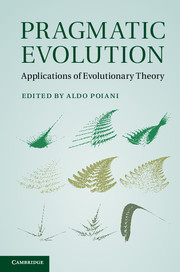Book contents
- Frontmatter
- Contents
- Contributors
- Acknowledgements
- Preface
- Introduction
- Part I Evolution, Ecology and Conservation
- Part II Evolution and Food Production
- Part III Evolution and Medicine
- Part IV Evolution and Psychology
- 10 Antecedents of teenage pregnancy: using an evolutionary perspective in the search for mechanisms
- 11 Flourishing, feelings, and fitness: an evolutionary perspective on health capability
- Part V Evolution and Computing
- Part VI Evolution and Society
- Index
- Plate Section
- References
11 - Flourishing, feelings, and fitness: an evolutionary perspective on health capability
from Part IV - Evolution and Psychology
Published online by Cambridge University Press: 05 April 2012
- Frontmatter
- Contents
- Contributors
- Acknowledgements
- Preface
- Introduction
- Part I Evolution, Ecology and Conservation
- Part II Evolution and Food Production
- Part III Evolution and Medicine
- Part IV Evolution and Psychology
- 10 Antecedents of teenage pregnancy: using an evolutionary perspective in the search for mechanisms
- 11 Flourishing, feelings, and fitness: an evolutionary perspective on health capability
- Part V Evolution and Computing
- Part VI Evolution and Society
- Index
- Plate Section
- References
Summary
Empty is that philosopher's argument by which no human suffering is therapeutically treated. For just as there is no use in a medical art that does not cast out the sicknesses of bodies, so too there is no use in philosophy, unless it casts out the suffering of the soul.
Epicurus (341–271 BCE)The goal for a theory of health and social justice is legitimacy in the moral, political, and policy implementation realms.
Jennifer Prah Ruger (2010, p. xii)What is knowledge good for?
In ancient Greece, ‘philosophy’ meant love (philia) of knowledge (sophia). Had Epicurus spoken the language of modern science he would have said something to the effect that there is no use in our only scientific theory of life unless it is good for something. Indeed, he might have gone on to explain that the ultimate function of our evolved capability for knowledge is therapy; goodness for us, so to speak. Knowledge is information about our material and social environments represented in our bodies. It helps us develop health and well-being and cast out disease and dysfunction, in ourselves and our loved ones. Aristotle and Confucius both used the metaphor of an archer to make the same point: just as it's hard for an archer to hit his mark without a clear view of the target, so too is it hard for our plans to succeed without a clear view of what they are for. Aristotle believed that ‘human flourishing’ should be the target of ethics and governments. As Jennifer Prah Ruger put it in Health and Social Justice, Aristotle believed that human ‘flourishing’ (eudaimonia) should be ‘the end of all political activity’ (2010, p. 45). Ruger's book is an exploration of what a health policy informed by Aristotelian ethics might look like. In his foreword to the book, Nobel Laureate Amartya Sen describes her project as one of shifting the target of public health from ‘good health policy’ to ‘policy good for health’ (p. ix). Ruger accomplishes this shift by emphasising the moral imperative of health. Health is special, she argues, just because it is constitutive of the ultimate aim of politics, human flourishing.
This is all well and good, but as a scientist I have to ask the begged question: why should we care about human flourishing or its constituents, including health? Why should it be the end of all political activity? My own target in what follows is to show how an evolutionary perspective on healthy feelings might contribute to ‘policy good for health’.
- Type
- Chapter
- Information
- Pragmatic EvolutionApplications of Evolutionary Theory, pp. 188 - 210Publisher: Cambridge University PressPrint publication year: 2011
References
- 1
- Cited by



